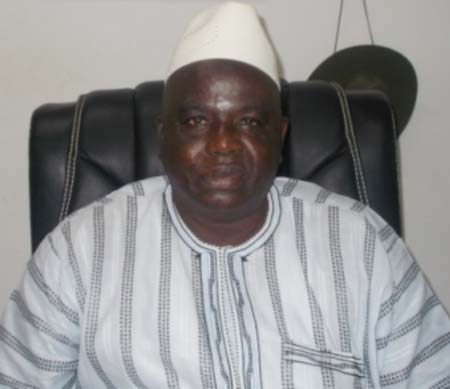
Mayor Bah raised the concern during a meeting with the police, heads of Banjul car parks, and representatives of transport unions, to discuss issues concerning big vehicles such as trucks being packed on the main roads of Banjul for days, causing traffic obstructions.
He also lamented the condition of the roads in Banjul.
The meeting was held on Friday 14 August 2015, at the Mayor’s Chambers at the Banjul City Council.
Mayor Bah called the stakeholders to see how best to address the issue of big lorries packing on roads around Banjul South, causing major traffic obstruction and also causing the piling of rubbish underneath the parked lorries, which is a health hazard to the community.
During the discussion, head of drivers and the car parks, as well as representatives of the transport unions expressed their constraints to the city council and called for intervention.
The mayor said the parking of trucks and other lorries along the highways causes “great obstruction” to traffic.
“The parking of lorries has a lot of negative impacts on the environment in the city, as it causes damage to the road, as well as littering and traffic obstruction.”
He disclosed that there is land allocated by the government to the city council around Bund Road, to be used as a multi-purpose car park for lorries.
As regards traffic signboards, Mayor Bah said the council in close collaboration with stakeholders would work on having traffic signboards to help the work of the police.
He also called for attitudinal change towards the development of the city, saying everyone has a role to play.
Samba Jobe, operations officer of the Gambia Transport Company, said the parking of lorries on the major roads in Banjul South was due to the lack of parking space in the city.
Most of these lorries come to Banjul to collect goods at Banjul port, and other lorries queue to use the ferry to cross to Barra.
The delay at the ferry crossing point in Banjul after vehicles have bought their tickets, causes them to wait for days to cross, he said, citing this as another major constraint.
Manlafi Camara, national transport field coordinator, said the car park allocated at Abuko “is too far for lorries to be parking until their turn reaches to collect their merchandise from Banjul.
Omar Ceesay, head of the main Banjul car park, also said “the main problem drivers are facing is the poor condition of the Primet Road” which, he added, is causing a lot of drivers to divert and ply other areas within the KM and WCR.
He further said they had always been making such complaints, adding that some drivers find it very difficult to go to Banjul, “because of the damages they incur with their vehicles”.
“A lot of commercial vehicles owners have warned their drivers not to go to Banjul anymore, due to the condition of the roads,” he added.
ASP Kebba Bojang, station officer of Banjul, called for the revitalization of the old system of control of the lorries, to avoid them parking on the highways of Banjul causing traffic obstructions.
ASP Ismaila Sallah of the Banjul Traffic Police Department also emphasised the importance of signboards on easing the work of the police.
He urged the transport services organisations to commit themselves in solving these problems.
Lala Camara, deputy commissioner of Banjul Division, also said it was important for all stakeholders to be committed to solving the problems, while assuring all of “the commitment of the police towards this cause”.


